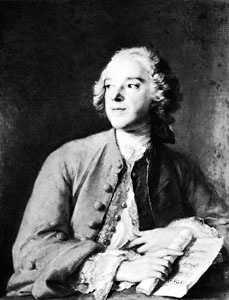Beaumarchais, Pierre-Augustin Caron de
French author
born Jan. 24, 1732, Paris, France
died May 18, 1799, Paris
 French author of two outstanding comedies of intrigue that still retain their freshness, Le Barbier de Séville (1775; The Barber of Seville, 1776) and Le Mariage de Figaro (1784; The Marriage of Figaro, 1785).
French author of two outstanding comedies of intrigue that still retain their freshness, Le Barbier de Séville (1775; The Barber of Seville, 1776) and Le Mariage de Figaro (1784; The Marriage of Figaro, 1785).Although Beaumarchais did not invent the type character of the scheming valet (who has appeared in comedy as far back as Roman times), his Figaro, hero of both plays, became the highest expression of the type. The valet's resourcefulness and cunning were portrayed by Beaumarchais with a definite class-conscious sympathy. Le Barbier de Séville became the basis of a popular opera by the Italian composer Gioacchino Rossini. The second play, which inspired W.A. Mozart's opera Le nozze di Figaro (1786), is openly critical of aristocratic privilege and somewhat anticipates the social upheavals of the Revolution of 1789.
Beaumarchais's life rivals his work as a drama of controversy, adventure, and intrigue. The son of a watchmaker, he invented an escapement mechanism, and the question of its patent led to the first of many legal actions. For his defense in these suits he wrote a series of brilliant polemics (Mémoires), which made his reputation, though he was only partly successful at law.
After 1773, because of his legal involvements, Beaumarchais left France on secret royal missions to England and Germany for both Louis XV and Louis XVI. Despite growing popularity as a dramatist, Beaumarchais was addicted to financial speculation. He bought arms for the American revolutionaries and brought out the first complete edition of the works of Voltaire. Of his dramatic works, only his two classic comedies were to have lasting success. Because of his wealth, he was imprisoned during the French Revolution (in 1792), but, through the intervention of a former mistress, he was released.
- Fenland
- fennec
- fennel
- Fenn, John B.
- Fenno, John
- Fennoman movement
- Fenoglio, Beppe
- Fenollosa, Ernest F.
- Fenrir
- Fen River
- Fens
- fentanyl
- Fenton, Elijah
- Fenton J A Hort
- Fenton, Lavinia
- Fenton, Roger
- fenugreek
- Feodor Chaliapin
- Feodor Lynen
- Feodosiya
- Feofan Prokopovich
- feoffment
- Feoktistov, Konstantin Petrovich
- Ferahan carpet
- Feraoun, Mouloud